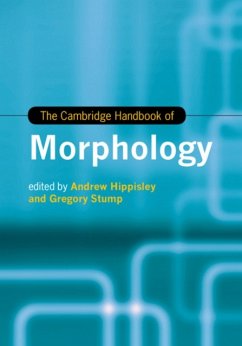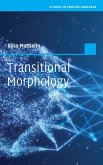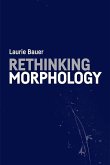The Cambridge Handbook of Morphology
Herausgeber: Hippisley, Andrew; Stump, Gregory
The Cambridge Handbook of Morphology
Herausgeber: Hippisley, Andrew; Stump, Gregory
- Gebundenes Buch
- Merkliste
- Auf die Merkliste
- Bewerten Bewerten
- Teilen
- Produkt teilen
- Produkterinnerung
- Produkterinnerung
The Cambridge Handbook of Morphology describes the diversity of morphological phenomena in the world's languages and provides students and scholars of linguistics with a comprehensive account of the interlocking issues and hypotheses that drive research on these phenomena. Contributors include many of the world's most eminent specialists in morphology.
Andere Kunden interessierten sich auch für
![Transitional Morphology Transitional Morphology]() Elisa Mattiello (Pisa UniversitA degli Studi)Transitional Morphology106,99 €
Elisa Mattiello (Pisa UniversitA degli Studi)Transitional Morphology106,99 €![Morphological Theory and the Morphology of English Morphological Theory and the Morphology of English]() Jan DonMorphological Theory and the Morphology of English33,99 €
Jan DonMorphological Theory and the Morphology of English33,99 €![The Language of Gaze The Language of Gaze]() Isabella PoggiThe Language of Gaze57,99 €
Isabella PoggiThe Language of Gaze57,99 €![An Introduction to English Morphology An Introduction to English Morphology]() Andrew Carstairs-McCarthyAn Introduction to English Morphology28,99 €
Andrew Carstairs-McCarthyAn Introduction to English Morphology28,99 €![A Historical Morphology of English A Historical Morphology of English]() Don RingeA Historical Morphology of English33,99 €
Don RingeA Historical Morphology of English33,99 €![Rethinking Morphology Rethinking Morphology]() Laurie BauerRethinking Morphology31,99 €
Laurie BauerRethinking Morphology31,99 €![The Oxford Handbook of Morphological Theory The Oxford Handbook of Morphological Theory]() The Oxford Handbook of Morphological Theory57,99 €
The Oxford Handbook of Morphological Theory57,99 €-
-
-
The Cambridge Handbook of Morphology describes the diversity of morphological phenomena in the world's languages and provides students and scholars of linguistics with a comprehensive account of the interlocking issues and hypotheses that drive research on these phenomena. Contributors include many of the world's most eminent specialists in morphology.
Produktdetails
- Produktdetails
- Cambridge Handbooks in Language and Linguistics
- Verlag: Cambridge University Press
- Seitenzahl: 878
- Erscheinungstermin: 16. Januar 2017
- Englisch
- Abmessung: 258mm x 184mm x 43mm
- Gewicht: 1862g
- ISBN-13: 9781107038271
- ISBN-10: 1107038278
- Artikelnr.: 45155191
- Herstellerkennzeichnung
- Libri GmbH
- Europaallee 1
- 36244 Bad Hersfeld
- gpsr@libri.de
- Cambridge Handbooks in Language and Linguistics
- Verlag: Cambridge University Press
- Seitenzahl: 878
- Erscheinungstermin: 16. Januar 2017
- Englisch
- Abmessung: 258mm x 184mm x 43mm
- Gewicht: 1862g
- ISBN-13: 9781107038271
- ISBN-10: 1107038278
- Artikelnr.: 45155191
- Herstellerkennzeichnung
- Libri GmbH
- Europaallee 1
- 36244 Bad Hersfeld
- gpsr@libri.de
1. Introduction Andrew Hippisley and Gregory Stump; Part I. Foundations of
Morphological Theory: 2. Two morphologies or one? Inflection versus
word-formation Andrew Spencer; 3. The minimal sign: morpheme or lexeme
James Blevins; 4. Productivity Georgette Dal and Fiammetta Namer; Part II.
Issues in Morphological Theory: 5. Alternations: stems and allomorphy Mary
Paster; 6. Morphological semantics Paolo Acquaviva; 7. Affix ordering:
motivation and interpretation Marianne Mithun; 8. The place of morphology
Mark Aronoff; 9. The status of paradigms Gilles Boyé and Gauvain Schalchli;
Part III. Morphological Principles: 10. Lexicalism, the principles of
morphology-free syntax and syntax-free morphology Paul O'Neill; 11.
Defaults and overrides in morphological description Dunstan Brown; 12.
Implicative relations in word-based morphological systems Farrell Ackerman
and Rob Malouf; Part IV. Morphological Frameworks: 13. Classical
morphemics: assumptions, extensions and alternatives Laurie Bauer; 14.
Natural morphology Wolfgang U. Dressler and Marianne Kilani-Schoch; 15.
Distributed morphology Martha McGinnis-Archibald; 16. Construction
morphology Geert Booij; 17. Paradigm function morphology Olivier Bonami and
Gregory Stump; 18. Network morphology Andrew Hippisley; Part V. The Role of
Morphology in Theories of Phonology and Syntax: 19. The role of morphology
in generative phonology, autosegmental phonology and prosodic morphology
Sharon Inkelas; 20. The role of morphology in optimality theory Zheng Xu;
21. The role of morphology in transformational grammar and its descendants
Stephen Anderson; 22. The role of morphology in constraint-based lexical
grammars Olivier Bonami and Berthold Crysmann; 23. The role of morphology
in dependency grammar Richard Hudson; Part VI. Domains for the Evaluation
of Morphological Theories: 24. Frequency and corpora Péter Rácz, Viktória
Papp and Jennifer Hay; 25. Morphology in linguistic typology Johanna
Nichols; 26. Morphology in language change Brian Joseph; 27. Morphology and
language acquisition Constantine Lignos and Charles Yang; 28. Experimental
morphology Harald Clahsen; 29. Computational morphology Lynne Cahill.
Morphological Theory: 2. Two morphologies or one? Inflection versus
word-formation Andrew Spencer; 3. The minimal sign: morpheme or lexeme
James Blevins; 4. Productivity Georgette Dal and Fiammetta Namer; Part II.
Issues in Morphological Theory: 5. Alternations: stems and allomorphy Mary
Paster; 6. Morphological semantics Paolo Acquaviva; 7. Affix ordering:
motivation and interpretation Marianne Mithun; 8. The place of morphology
Mark Aronoff; 9. The status of paradigms Gilles Boyé and Gauvain Schalchli;
Part III. Morphological Principles: 10. Lexicalism, the principles of
morphology-free syntax and syntax-free morphology Paul O'Neill; 11.
Defaults and overrides in morphological description Dunstan Brown; 12.
Implicative relations in word-based morphological systems Farrell Ackerman
and Rob Malouf; Part IV. Morphological Frameworks: 13. Classical
morphemics: assumptions, extensions and alternatives Laurie Bauer; 14.
Natural morphology Wolfgang U. Dressler and Marianne Kilani-Schoch; 15.
Distributed morphology Martha McGinnis-Archibald; 16. Construction
morphology Geert Booij; 17. Paradigm function morphology Olivier Bonami and
Gregory Stump; 18. Network morphology Andrew Hippisley; Part V. The Role of
Morphology in Theories of Phonology and Syntax: 19. The role of morphology
in generative phonology, autosegmental phonology and prosodic morphology
Sharon Inkelas; 20. The role of morphology in optimality theory Zheng Xu;
21. The role of morphology in transformational grammar and its descendants
Stephen Anderson; 22. The role of morphology in constraint-based lexical
grammars Olivier Bonami and Berthold Crysmann; 23. The role of morphology
in dependency grammar Richard Hudson; Part VI. Domains for the Evaluation
of Morphological Theories: 24. Frequency and corpora Péter Rácz, Viktória
Papp and Jennifer Hay; 25. Morphology in linguistic typology Johanna
Nichols; 26. Morphology in language change Brian Joseph; 27. Morphology and
language acquisition Constantine Lignos and Charles Yang; 28. Experimental
morphology Harald Clahsen; 29. Computational morphology Lynne Cahill.
1. Introduction Andrew Hippisley and Gregory Stump; Part I. Foundations of
Morphological Theory: 2. Two morphologies or one? Inflection versus
word-formation Andrew Spencer; 3. The minimal sign: morpheme or lexeme
James Blevins; 4. Productivity Georgette Dal and Fiammetta Namer; Part II.
Issues in Morphological Theory: 5. Alternations: stems and allomorphy Mary
Paster; 6. Morphological semantics Paolo Acquaviva; 7. Affix ordering:
motivation and interpretation Marianne Mithun; 8. The place of morphology
Mark Aronoff; 9. The status of paradigms Gilles Boyé and Gauvain Schalchli;
Part III. Morphological Principles: 10. Lexicalism, the principles of
morphology-free syntax and syntax-free morphology Paul O'Neill; 11.
Defaults and overrides in morphological description Dunstan Brown; 12.
Implicative relations in word-based morphological systems Farrell Ackerman
and Rob Malouf; Part IV. Morphological Frameworks: 13. Classical
morphemics: assumptions, extensions and alternatives Laurie Bauer; 14.
Natural morphology Wolfgang U. Dressler and Marianne Kilani-Schoch; 15.
Distributed morphology Martha McGinnis-Archibald; 16. Construction
morphology Geert Booij; 17. Paradigm function morphology Olivier Bonami and
Gregory Stump; 18. Network morphology Andrew Hippisley; Part V. The Role of
Morphology in Theories of Phonology and Syntax: 19. The role of morphology
in generative phonology, autosegmental phonology and prosodic morphology
Sharon Inkelas; 20. The role of morphology in optimality theory Zheng Xu;
21. The role of morphology in transformational grammar and its descendants
Stephen Anderson; 22. The role of morphology in constraint-based lexical
grammars Olivier Bonami and Berthold Crysmann; 23. The role of morphology
in dependency grammar Richard Hudson; Part VI. Domains for the Evaluation
of Morphological Theories: 24. Frequency and corpora Péter Rácz, Viktória
Papp and Jennifer Hay; 25. Morphology in linguistic typology Johanna
Nichols; 26. Morphology in language change Brian Joseph; 27. Morphology and
language acquisition Constantine Lignos and Charles Yang; 28. Experimental
morphology Harald Clahsen; 29. Computational morphology Lynne Cahill.
Morphological Theory: 2. Two morphologies or one? Inflection versus
word-formation Andrew Spencer; 3. The minimal sign: morpheme or lexeme
James Blevins; 4. Productivity Georgette Dal and Fiammetta Namer; Part II.
Issues in Morphological Theory: 5. Alternations: stems and allomorphy Mary
Paster; 6. Morphological semantics Paolo Acquaviva; 7. Affix ordering:
motivation and interpretation Marianne Mithun; 8. The place of morphology
Mark Aronoff; 9. The status of paradigms Gilles Boyé and Gauvain Schalchli;
Part III. Morphological Principles: 10. Lexicalism, the principles of
morphology-free syntax and syntax-free morphology Paul O'Neill; 11.
Defaults and overrides in morphological description Dunstan Brown; 12.
Implicative relations in word-based morphological systems Farrell Ackerman
and Rob Malouf; Part IV. Morphological Frameworks: 13. Classical
morphemics: assumptions, extensions and alternatives Laurie Bauer; 14.
Natural morphology Wolfgang U. Dressler and Marianne Kilani-Schoch; 15.
Distributed morphology Martha McGinnis-Archibald; 16. Construction
morphology Geert Booij; 17. Paradigm function morphology Olivier Bonami and
Gregory Stump; 18. Network morphology Andrew Hippisley; Part V. The Role of
Morphology in Theories of Phonology and Syntax: 19. The role of morphology
in generative phonology, autosegmental phonology and prosodic morphology
Sharon Inkelas; 20. The role of morphology in optimality theory Zheng Xu;
21. The role of morphology in transformational grammar and its descendants
Stephen Anderson; 22. The role of morphology in constraint-based lexical
grammars Olivier Bonami and Berthold Crysmann; 23. The role of morphology
in dependency grammar Richard Hudson; Part VI. Domains for the Evaluation
of Morphological Theories: 24. Frequency and corpora Péter Rácz, Viktória
Papp and Jennifer Hay; 25. Morphology in linguistic typology Johanna
Nichols; 26. Morphology in language change Brian Joseph; 27. Morphology and
language acquisition Constantine Lignos and Charles Yang; 28. Experimental
morphology Harald Clahsen; 29. Computational morphology Lynne Cahill.








